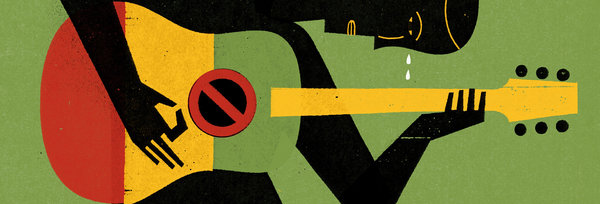By ANGELIQUE KIDJO
source: The New York Times
IN 1974, I was a young girl watching the Nigerian newscast on our blinking TV set, sitting on the patio of the family house in Cotonou, Benin. Suddenly I saw Winnie Mandela in the middle of a crowd, talking about her husband in jail in South Africa. That was the first time I heard about apartheid.
My whole world collapsed.
I had been raised with nine brothers and sisters in a modest and loving family, protected from the harsh realities of my continent. My parents had told me that you don’t judge people by their color and that we’re all born equal. Every day, we welcomed expatriates from all corners of the world.
That day, on the TV screen, I could see the anger and the despair in the eyes of the South Africans. I was learning about the injustice of apartheid. I felt a sudden rage.
I had been singing on stage since I was six; music was the center of my life. My first reaction was to write a song: instead of screaming my rage I would sing it.
The song that came to me was a harsh and hateful song. When my father heard it, he told me: “ You can’t sing this, music is not there to preach hate and violence. I understand your frustration and your pain, but you can’t use your songs to add fuel to the fire. Music is supposed to bring people together and fight for peace, because it is art and beauty, not politics.”
Many years later, I truly believe that music helped free Mandela. Johnny Clegg’s“Asimbonanga” comes to mind, as does Peter Gabriel’s “Biko.” So many artists wrote songs for Mandela, putting much international pressure on South Africa.
The songs were stronger than speeches. Who will remember a politician’s speeches? But everyone can sing Bob Marley’s lines, “Emancipate yourselves from mental slavery.” The few political speeches that have made a mark in history — from Haile Selassie, Martin Luther King or John F. Kennedy — sound like songs!
That is the power of music. The mix of melodies and words carries a message much more powerful than spoken ideas.
Why? Maybe because when someone sings, truth speak directly to your heart.
With the 1960’s emerged protest songs written to change the world. Two decades later, rap reported on social realities nobody wanted to hear about. In this digital age, the audience for songs of social commentary and protest has grown: if you want to express your views, you don’t need a big music company: just post your songs online.
In a way, the music industry no longer controls the political content of music. In 2003, I proudly joined other musicians to sign a full-page ad in The New York Times lambasting the prospect of a war in Iraq. The world was so polarized then that I wondered if the major music label that signed me would ever let me record again.
Today, the Russian group Pussy Riot doesn’t need a music company to carry its message to the world. That explains why the greatest challenge protest music faces today is censorship. We’ve seen the price three members of Pussy Riot paid: they were sentenced to two years in a prison colony, although one was later released.
An Islamist Web site issued a $100,000 bounty for the death of Iranian rapper Shahin Najafi because of his views on politics and religion.
Self-censorship is also part of the equation: you may think twice before singing for freedom in Tibet if you know you may be prevented from touring in China.
Because the content of songs is now uncontrollable, the potential of violence threatens the very existence of music. The Pakistani star Ghazala Javed, who married into a very conservative Muslim family, was killed this year likely because of what she was singing.
Music in itself is the expression of freedom, and in some parts of the world, the joy and liberty it invokes are unbearable. It is painful to think that in northern Mali, the land of Ali Farka Touré, and a region some believe is the birthplace of the blues, music is being completely silenced by militants who adhere to strict Islamic laws.
During my childhood in West Africa, music was part of daily life. Traditional musicians recounted our history and offered political and moral commentary. When they played, we would dance, sing, feeling the simple joy of being together.
This is the strongest message music can carry today: do not listen to people telling us our cultures are irreconcilable and we can’t live together.
Universal access to music must be cherished; we must continue to fight against censorship by supporting artists who are silenced and by speaking out against dictatorships that silence them.
When the Israeli singer Rita Jahanforuz sings the Iranian songs of her childhood, political and religious frontiers start to crumble. Her unlikely and moving success in both countries gives me so much hope.
Within that hope is the long-lasting message of my father: “Sing to unite, not to divide!”
Kidjo is a Grammy award-winning Beninoise singer-songwriter and activist. She is the first woman to be listed among “The 40 Most Powerful Celebrities In Africa” by Forbes Magazine.
Angelique’s Voice Project Episode:

